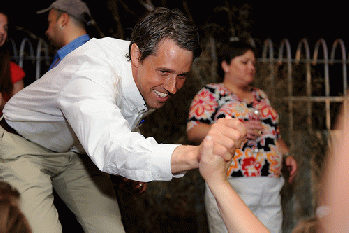From New Yorker
Listening to Beto O'Rourke, who, in a video posted on Thursday, announced that he is running for President, it's hard not to admire his buoyantly, even boyishly, optimistic conviction that, if we all simply connect, we can fashion a kinder America. He comes across as the anti-Trump, reaching out to the best in us. In his announcement video, O'Rourke says that "this moment of peril produces perhaps the greatest moment of promise for this country." He then outlines the issues that a resolved nation can tackle -- jobs, health care, racism, immigration -- before adding, "Perhaps most importantly of all, because our very existence depends on it, we can unleash the ingenuity and creativity of millions of Americans who want to insure that we squarely confront the challenge of climate change, before it's too late." That's an essential goal, and, in the coming weeks, the candidate could demonstrate how he can help the country achieve it by clarifying his stance on a seemingly narrow issue: natural gas.
Last October, in the heart of Texas hydrocarbon country and in the final weeks of his Senate contest with Ted Cruz, O'Rourke told the Midland Reporter-Telegram that "the natural gas that we use as a cleaner energy source here in this country could be something that replaces coal-fired plants in China, in India -- two of the largest economies on the planet that are burning coal and contributing to climate change. I'd much rather they burn natural gas from Texas that's connected to jobs here."
On Thursday, in Keokuk, Iowa, during his first campaign appearance as a Presidential candidate, O'Rourke praised the Green New Deal, particularly its call to "get to net-zero emissions." He said, "We have no more than 12 years to take incredibly bold action on this." To be clear, the Green New Deal envisions burning no natural gas for electricity by 2030 and instead generating power from renewable sources. No one is calling for immediately shutting down natural-gas-fired power plants, but if you're for a Green New Deal, you probably should make clear that you're against building new plants and the pipelines that feed them.
In fact, that transition is already starting to happen in places such as India and China, where the use of renewable energy is increasing at a breakneck pace because it is both cheap and clean. And it could happen here, too: as the C.E.O. of a solar company said earlier this year, "I can beat a gas peaker anywhere in this country with a solar-plus-storage power plant."
But the pressures to keep doing more of what we're used to are enormous. Texas has the second-largest economy in the country; oil and gas are still the state's largest industries. For employees of those companies, who, in 2018, contributed more money to O'Rourke's campaign than to that of any other member of Congress except Cruz (it's Texas, after all), natural-gas production is a way to extend their livelihoods for a few more decades. (Unlike Cruz, O'Rourke took no money from pacs.) Those parts of organized labor skilled at building pipelines and gas plants want to keep their jobs, too; indeed, the A.F.L.-C.I.O.'s energy committee said last week that it could not support the Green New Deal, stating in a letter to its congressional sponsors that "we will not stand by and allow threats to our members' jobs and their families' standard of living go unanswered."
These pressures are why, for eight years, President Obama supported fracking -- it's the path of least resistance. In fairness to Obama, when his term in office began, we still thought of natural gas as the cleaner fossil fuel, because it gives off less carbon when it burns than coal does. But it turns out that fracking not only pollutes water and damages communities; over the past decade, scientists have demonstrated that the leaking methane that invariably accompanies fracking can make natural gas as bad for the climate as coal. Meanwhile, the price of renewables has fallen so far and so fast that we no longer need a "bridge fuel" to get us from coal to something truly clean, however convenient that prospect would be for those enmeshed in the current system. (Still, the science and the economics have not yet been enough to overcome the status quo, as I learned, in 2016, when Bernie Sanders, whom I supported, named me to the Democratic platform-writing panel; my arguments, and those of other anti-fracking campaigners, were not enough to get the document changed.)
By 2019, though, climate change has progressed to the point where a middle-of-the-road, all-of-the-above strategy is impossible: less for reasons of politics, where it may always be the easiest to sell, than for reasons of physics. O'Rourke, who has been strong on a range of other environmental issues, could conceivably be a central figure in the transition to renewable energy. Oil and gas may still be dominant in Texas, but O'Rourke's home state also has the largest wind-power capacity in the country, and it is one of the five largest producers of solar energy. And, in 2017, the Bureau of Labor Statistics reported that solar photovoltaic installers and wind-turbine-service technicians are the fastest-growing occupations in the country. So, just as it took a politician of the right, Richard Nixon, to open up relations with China, a Texan might be just the person to persuade oil-and-gas workers that their futures can lie in building solar installations and wind farms -- and to stand up to the fossil-fuel companies and the pacs that have so dominated our politics. Because we've run out of spare decades in which to play political games.






